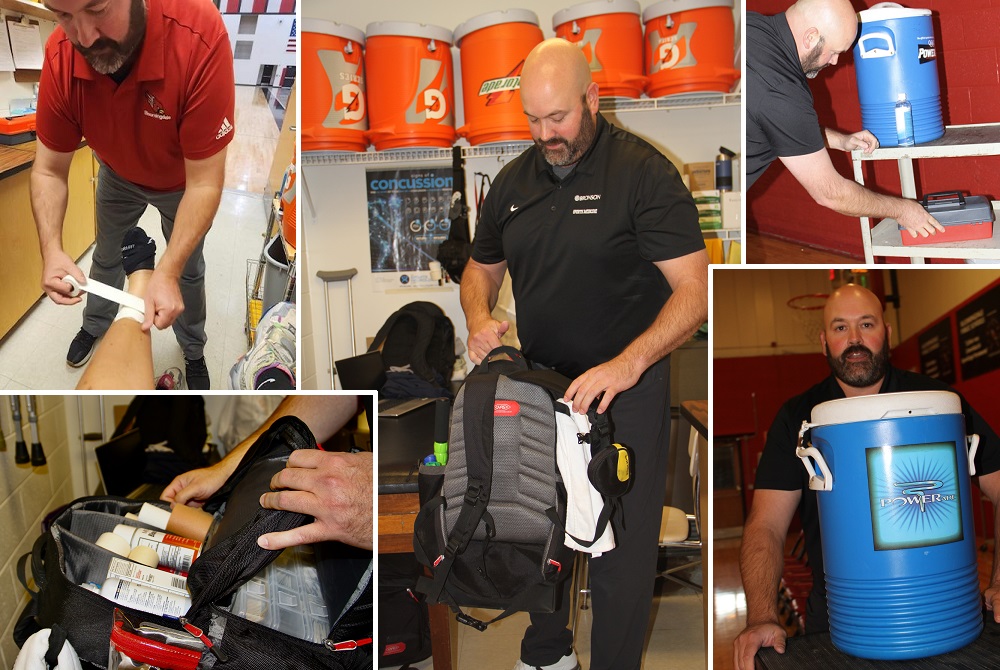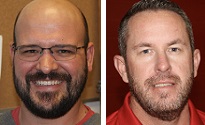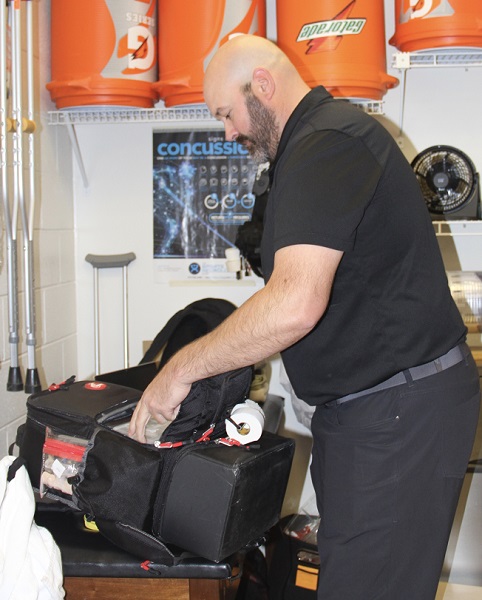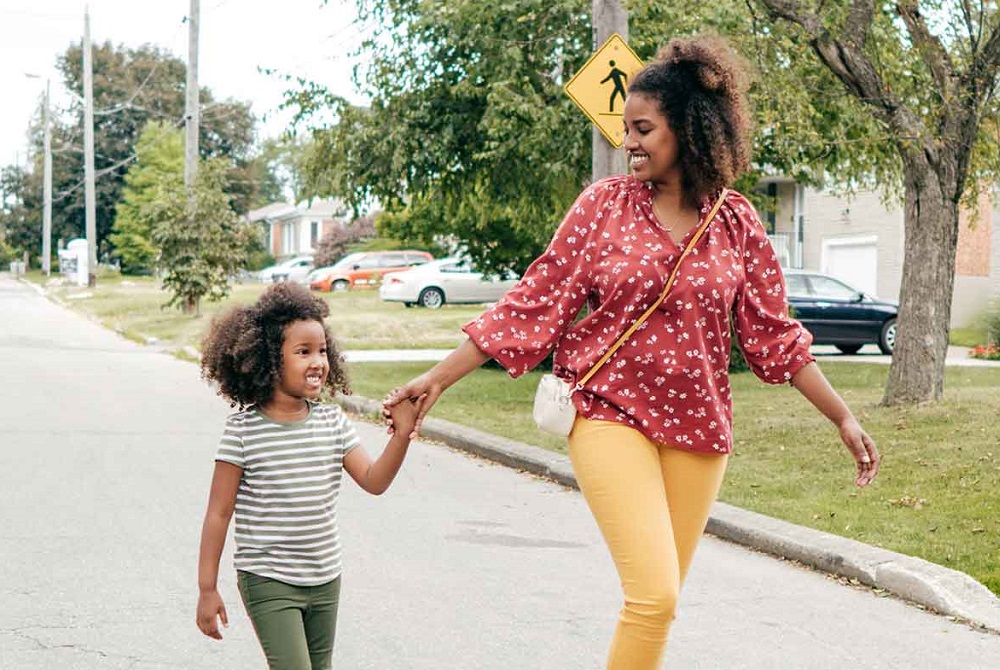
Bloomingdale Trainer Performing Invaluable Role in Keeping Athletes Playing
By
Pam Shebest
Special for MHSAA.com
November 22, 2022
BLOOMINGDALE — If Scott Allison looks bored during one of Bloomingdale’s sporting events, that is a good thing.
 “Trainers like to be behind the scenes and in the shadows,” the certified athletic trainer said. “We’re only needed in emergencies.
“Trainers like to be behind the scenes and in the shadows,” the certified athletic trainer said. “We’re only needed in emergencies.
“It’s one of those jobs that if we’re sitting around looking bored, then things are going well.”
But if an athlete goes down with an injury, Allison is quick to run onto the court or field.
In his first year at Bloomingdale, he has found that working with middle and high school students is a lot different than his previous work with the minor-league hockey Kalamazoo Wings.
Treating the hockey team, with whom he spent much of his 22 years, “There was a lot of traumatic stuff like lacerations or deep contusions, overuse injuries like hip flexors or core injuries or broken bones.
“Everything’s acute and fast. It’s a different animal. In hockey, they’re all pro athletes so they know their bodies really well.”
However, high school and middle school athletes are still in a growing phase.
“These kids don’t really know what’s going on a lot of times, so it’s a lot more education on what’s happening,” Allison said.
“Is it an injury, or is it just soreness? You get a lot of kids that don’t understand the difference between aches and pains or an injury. We see a lot of ankle sprains or shin splints because they’re just developing. They’re in that awkward range where their bodies try to grow too fast.”
 Allison is the Cardinals’ first certified athletic trainer, a new position for which athletic director Jason Hayes campaigned.
Allison is the Cardinals’ first certified athletic trainer, a new position for which athletic director Jason Hayes campaigned.
“What we notice is that if a kid’s injured, they’re out a lot less if you have a trainer because it speeds up recovery time,” said Hayes, who also coaches varsity football and is an assistant wrestling coach. “It’s like having a built-in physical therapist on your staff, too.”
Studies support Hayes’ statements.
According to information from The Sports Institute at University of Washington, “‘The athletic trainers know the athletes,” says Stan Herring, M.D., cofounder of The Sports Institute at (University of Washington) Medicine and a team physician for the Seattle Seahawks and Seattle Mariners. “They see the athletes frequently, if not every day. They know when something is wrong. They are medical professionals who evaluate, treat and rehabilitate athletes.’”
The article continued: “Three recent studies suggest that athletic trainers are linked to significant improvements in the diagnosis of concussion in young athletes and significant reductions in ‘time-loss’ injuries that require athletes to take time away from sports.”
Allison sees himself as a teacher as well as a trainer.
“We see a lot more strains or growth issues,” he said. “A lot of it is maintenance and teaching kids what’s going on with their bodies or what they need to do to change things.”
He also meets with parents and coaches to talk about the best way to prevent injuries.
Allison’s day begins about 1:30 or 2 p.m., giving athletes a chance to talk with him before practices or games.
During the action, he always has his first aid backpack filled with the basics: air splints for fractures or dislocations, AED, EpiPens, and bench kits (with taping and bandaging supplies, splints, gauze, ACE wraps, ice bags, latex gloves and other basic first aid supplies.)
He travels with the teams when they are involved in high-impact sports, such as football, and many times he is also called to treat an opposing player if that team has no trainer.
 Allison is a perfect fit with Bloomingdale, Hayes said.
Allison is a perfect fit with Bloomingdale, Hayes said.
His wife, Kirsten, coached the Cardinals girls basketball team for seven years. His daughter Emma, now at Glen Oaks Community College, graduated from there, and his daughter Bailey is an eighth grader.
“We are a very lucky town,” Hayes said. “We had Doc (Robert) Stevens, who had been volunteering as our athletic trainer for 15 years. He’s just aging out.
“About a year ago, he came to me and said that it was his last year. Scott has 22 years experience, and he has relationships here. To me, it was a no-brainer.”
Assistant varsity football coach Lance Flynn, who also coaches the middle school football team, saw Allison in action during competition in the fall.
“First quarter in a middle school football game, a kid broke his arm,” Flynn said. “My own son, Ryder, was on the varsity team and he sprained his AC socket and Scott took care of him.
“If something happens during a game, they can go see him and I don’t have to worry much because I know they’re in good hands.”
Allison’s affiliation with Bronson Sports Medicine is also a plus, the trainer said.
“With Bronson, we can offer a lot more and expedite getting in to see doctors or specialists if we need to,” he said. “We’re on the same system as the doctors, so we can diagnose and send notes to the doctors and they can send notes back to us.
“If there’s anybody we need to keep track of with the doctors, I can talk with the doctors and figure out how that’s going. If anybody needs to see me, they know I’m here early if they just want to come down to talk.”
Bronson also provides certified athletic trainers at 21 other southwest Michigan high schools: Brooke Vandepolder (Battle Creek Central), Lindsay Aarseth-Lindhorst (Climax-Scotts), Amanda Monsivaes (Comstock), Makenzie Hodgson (Delton Kellogg), Salvador Robles-Soriano (Gobles), Holly Ives (Richland Gull Lake), Katelyn Baker-Contreras (Kalamazoo Hackett Catholic Prep), Lizzy Smith (Kalamazoo Central), Emma Beener (Kalamazoo Christian), Holly Sisson (Kalamazoo Loy Norrix), Nico Talentino (Mattawan), Aaron Eickhoff (Otsego), Quincey Powell (Parchment), Malorie Most (Paw Paw), Jessica Bakhuyzen (Plainwell), Lance LeTourneau (Portage Central), Janelle Currie (Portage Northern), Carrie Calhoun (Schoolcraft), Chelsea Harrison (South Haven), Alexis Walters (Three Rivers) and Natalie McClish (Vicksburg).
 Pam Shebest served as a sportswriter at the Kalamazoo Gazette from 1985-2009 after 11 years part-time with the Gazette while teaching French and English at White Pigeon High School. She can be reached at [email protected] with story ideas for Calhoun, Kalamazoo and Van Buren counties.
Pam Shebest served as a sportswriter at the Kalamazoo Gazette from 1985-2009 after 11 years part-time with the Gazette while teaching French and English at White Pigeon High School. She can be reached at [email protected] with story ideas for Calhoun, Kalamazoo and Van Buren counties.
PHOTOS (Top) Bloomingdale trainer Scott Allison has several tasks as he works to keep the school’s student-athletes healthy and pain-free. (Middle) Bloomingdale athletic director Jason Hayes, left, and assistant varsity football coach Lance Flynn. (Below) Allison packs his bag for another full afternoon. (Ankle-taping photo by Andreya Robinson; all other photos by Pam Shebest.)

Wake Up And Walk! 7 Benefits Of Taking A Morning Stroll
By
Nick Parkinson, M.Ed., AT, ATC, TSAC-F
Henry Ford Health
May 3, 2022
 Still having difficulty fitting exercise into your day? Start by heading out for a morning walk.
Still having difficulty fitting exercise into your day? Start by heading out for a morning walk.
No matter your fitness level, walking offers tremendous benefits, including improving your mood, managing your weight, increasing your energy and reducing your risk for disease. All you need is a good pair of walking shoes and a place to stroll.
7 Benefits Of A Morning Walk
Starting your day with a morning walk helps you check something important off your daily to-do list – your fitness.
Even if you only have time for a 10-minute walk each morning, you’ll have up to 70 minutes of exercise by the end of the week. And any type of movement that you add in later in the day, whether it’s taking the stairs or walking to your car at the far end of the parking lot, improves your overall health.
Morning walks offer many benefits, helping to:
Boost your inner athlete. Taking a morning walk boosts your stamina, flexibility and energy. As your fitness improves, you’ll be able to move through your daily activities more easily.
Improve your mood. Getting outside gives you a chance to enjoy fresh air and nature. Walking, like any form of exercise, reduces stress and anxiety. You’ll start the day with a positive attitude, better able to manage challenges during the day.
Increase your productivity. After a morning walk, you feel energized and ready to take on the day. Starting your day with physical activity improves your concentration and productivity.
Keep you standing tall. Many of us are sitting at work or school for several hours each day, often without watching our posture. Walking with your shoulders back and head held up improves posture. Walking also improves your core muscles, which help support your spine.
Manage your weight. After a full night’s sleep, walking helps jump-start your metabolism, allowing you to burn calories at a faster rate. Along with a healthy diet, walking can help manage weight.
Reduce your risk for disease. A regular walking routine can reduce your risk for diabetes, heart disease, hypertension (high blood pressure), obesity and some cancers.
Strengthen your bones. Our bodies are constantly making new bone and breaking down old bone. After age 50, we lose bone mass as our bodies break down old bone at a faster rate. Along with a healthy diet, weight-bearing exercise like walking strengthens your bones and reduces your risk for osteoporosis.
How To Start Your Morning Walk Routine
Keep these strategies in mind as you plan your morning stroll:
Eat a light snack before you walk. After sleeping all night, it’s helpful to eat a light snack or breakfast before heading out the door. Toast with almond butter or some yogurt with nuts and berries can give you the energy you need, especially if you’re planning a longer walk.
Check out different walking routes or events. On a busy morning, you may choose to walk close to home to save time. When your schedule permits, explore different neighborhoods, nature preserves or trails in your area. You may also want to check out local 5K races — many of these events welcome walkers.
Don’t forget to stretch. After walking, take a few minutes to stretch your leg muscles to work out any knots in your calves, hamstrings or thighs.
Increase impact with weights and intervals. As you build your stamina, boost the benefits of your walk by holding light weights or wearing a weighted vest. Try turning your walk into an interval training session by alternating between a fast and slow pace.
Prepare for the weather. To avoid falling on icy winter sidewalks, wear proper boots and spikes. Wear hats, scarves and gloves to protect your skin from frostbite. Wear a hat and sunscreen in the summer heat. Carry a water bottle to stay hydrated, especially on longer walks.
Schedule your morning walks. Add a morning walk to your calendar and keep the appointment. Over time, morning walks can become a habit you won’t want to give up.
Walk with a buddy. Find a walking partner who will hold you accountable for your commitment to exercise. To enjoy even more socializing as you walk, check out walking groups in your community.
To find a doctor at Henry Ford, visit henryford.com or call 1-800-436-7936.
Nick Parkinson, M.Ed., AT, ATC, TSAC-F Supervisor of Athletic Training with Henry Ford Sports Medicine, also leads Sports Performance training at the William Clay Ford Center for Athletic Medicine. He is a regular contributor to Henry Ford LiveWell. Learn more about Nick

